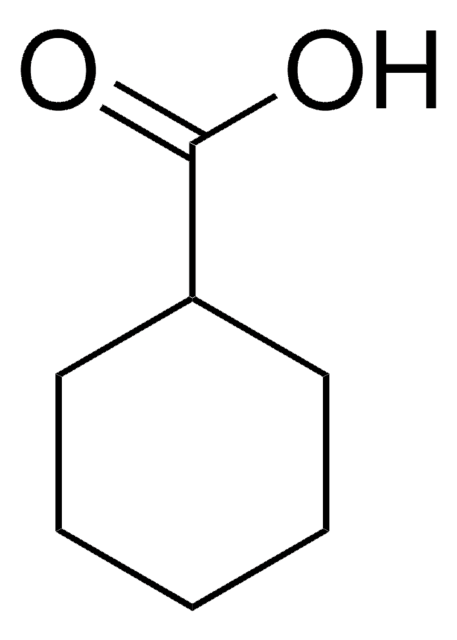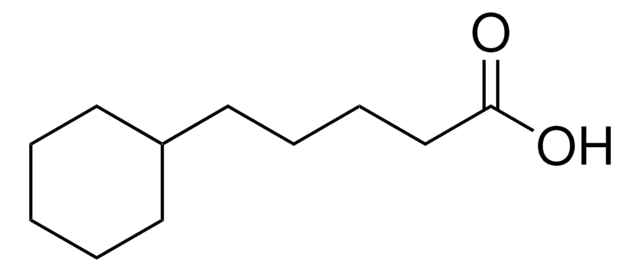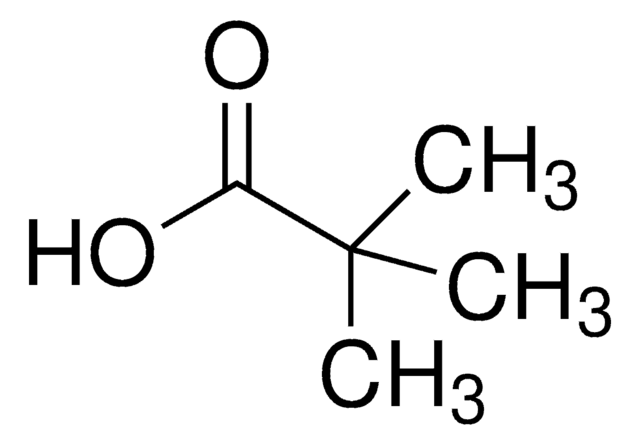All Photos(1)
About This Item
Linear Formula:
(C6H11)2CHCO2H
CAS Number:
Molecular Weight:
224.34
MDL number:
UNSPSC Code:
12352100
PubChem Substance ID:
NACRES:
NA.22
Recommended Products
Assay
99%
form
solid
mp
139-141 °C (lit.)
SMILES string
OC(=O)C(C1CCCCC1)C2CCCCC2
InChI
1S/C14H24O2/c15-14(16)13(11-7-3-1-4-8-11)12-9-5-2-6-10-12/h11-13H,1-10H2,(H,15,16)
InChI key
PGGMEZOUAPIYOY-UHFFFAOYSA-N
Application
Dicyclohexylacetic acid was used in the synthesis of 2,2-dicyclohexyl-1-(4′-methyl)-phenylethanone. It was also used in the synthesis of catena-poly [[trimethyltin (IV)]--2, 2-dicyclohexylacetato-2O: O′].
Signal Word
Warning
Hazard Statements
Precautionary Statements
Hazard Classifications
Eye Irrit. 2 - Skin Irrit. 2 - STOT SE 3
Target Organs
Respiratory system
Storage Class Code
11 - Combustible Solids
WGK
WGK 3
Flash Point(F)
Not applicable
Flash Point(C)
Not applicable
Personal Protective Equipment
dust mask type N95 (US), Eyeshields, Gloves
Certificates of Analysis (COA)
Search for Certificates of Analysis (COA) by entering the products Lot/Batch Number. Lot and Batch Numbers can be found on a product’s label following the words ‘Lot’ or ‘Batch’.
Already Own This Product?
Find documentation for the products that you have recently purchased in the Document Library.
Customers Also Viewed
catena-Poly [[trimethyltin (IV)]--2, 2-dicyclohexylacetato-2O: O′].
Cheikh AKD, et al.
Acta Crystallographica Section E, Structure Reports Online, 63(1), m258-m260 (2006)
Excited precursor reactivity, fast 1, 2-H shifts, and diffusion-controlled methanol insertion in 1, 2-Diphenylalkylidenes.
Motschiedler K, et al.
The Journal of Organic Chemistry, 64(14), 5139-5147 (1999)
Mohamed H Mohamed et al.
Journal of colloid and interface science, 395, 104-110 (2013-02-05)
Tensiometry was used to provide estimates of the critical micelle concentration (cmc) values for three sources of naphthenic acids (NAs) and three examples of single component NAs (S1-S3) in aqueous solution at pH 10.5 and 295 K. Two commercially available
Mette Kristensen et al.
Journal of chromatography. A, 1601, 21-26 (2019-05-13)
Gas-chromatography (GC) analysis of carboxylic acids is limited by the high polarity and low volatility of most of these compounds. Boron trifluoride (BF3) mediated alkylation reactions is one of the most commonly used derivatization methods for making carboxylic acids GC
Dieter Schemeth et al.
Analytica chimica acta, 1038, 182-190 (2018-10-04)
In this study, we focus on isolation and fractionation strategies by solid phase extraction (SPE) for a broad range of environmentally related organic acids. These emerging potential contaminants are primary degradation products of spilled petrogenic compounds but little attention has
Our team of scientists has experience in all areas of research including Life Science, Material Science, Chemical Synthesis, Chromatography, Analytical and many others.
Contact Technical Service












